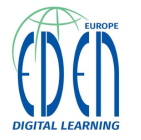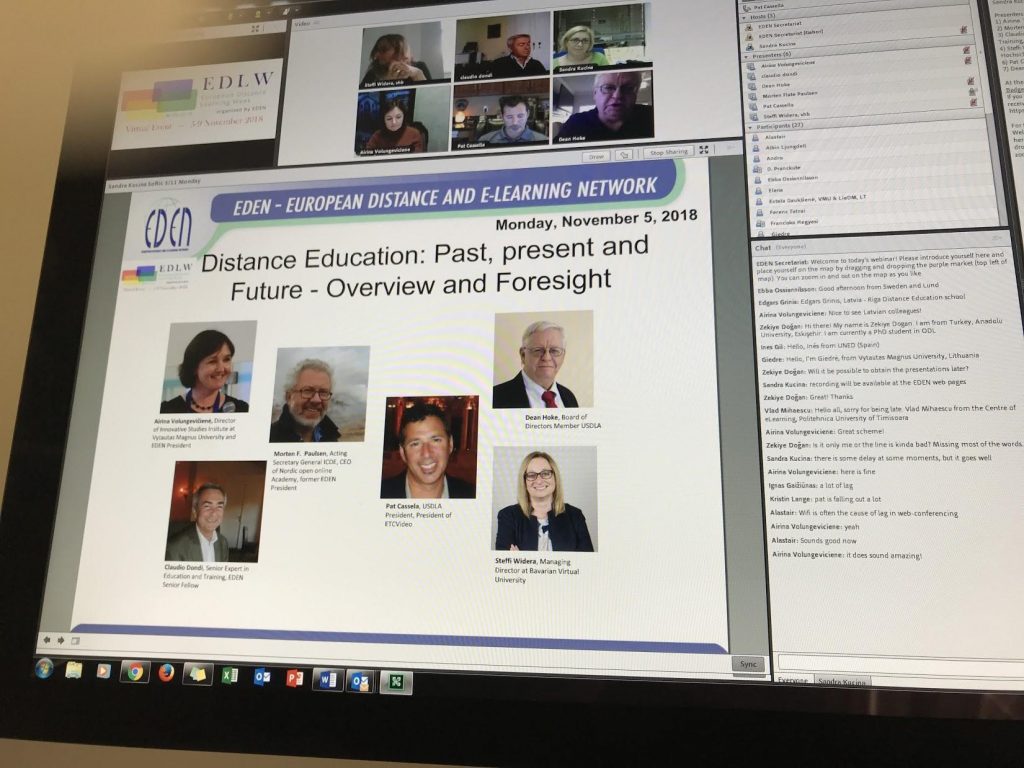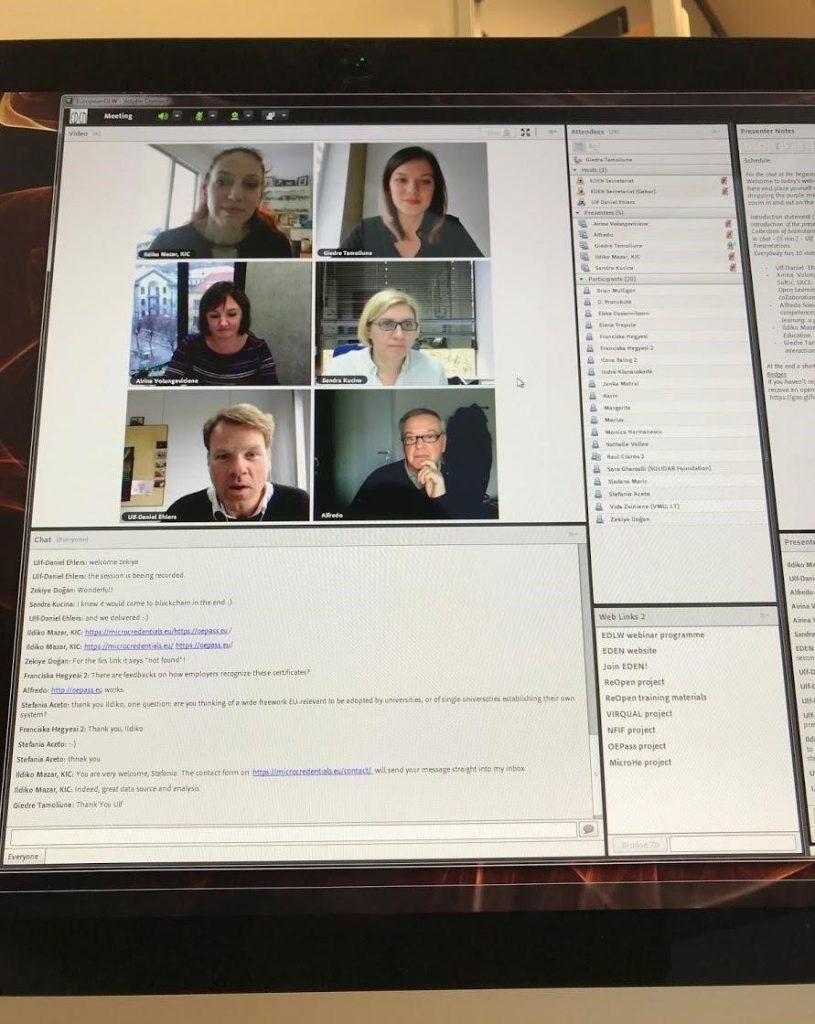The third European Distance Learning Week (EDLW) organized by EDEN on November 5 – 9, 2018, received high attendance from online community members (both, synchronously and asynchronously) and also high quality feedback from the participants of the events with appreciation expressed towards the topics selected, the panelists and the presenters invited to the webinars of the week.
EDLW events received 519 registrations, lower synchronous attendance during the sessions, but high numbers in webinar record views: 1534 authentic reviews has been recorded of all the sessions already during the week! Of course, recordings are available for later review for all interested in new and important developments.
Also as in previous years, the week was organized continuing a successful transnational collaboration with the United States Distance Learning Association (USDLA) in synergy with the US National Distance Learning Week. EDEN expresses sincerest gratitude to the USDLA President Pat Cassella and the USDLA Board member Dean Hoke for great support, continuous collaboration and their personal contributions to EDLW Opening Panel. Thank you!
The Opening Panel of the week (the most popular event in record reviews during the week) discussed the Past, the Present and the Future of Distance Education in Europe and globally. Invited expert panel members from EDEN Fellows, ICDE, USDLA and EDEN member institutions reflected on how distance education evolved, how open and distance learning contributed towards the development of education and its quality, what lessons may be learnt and how open education contributed to the developments that we have today.
Here is how Sandra Kučina, EDEN Vice President and the moderator of the Panel summarises the expert discussion:
“Distance education has evolved into an accepted way of learning. New technologies have transformed students into mobile learners, enabled those non-traditional students and those of the lower socioeconomic status to have the opportunity to learn, workplaces today demand continuous learning and even our children are introduced to technology before entering the classroom. More valuable opportunities for our progress paths are made possible through distance learning today. Understanding, focus and practices are very diverse and what is needed is monitoring of implementation and evaluation of progress and results and foresighting of future development. Panelist agreed that dissemination of best practices but also dissemination of unsuccessful practices is very important in order to learn from each other. The understanding of possibilities of new ways of teaching and learning and training of teachers are key issues. The number of people taking some kind of distance education has grown rapidly in the last fifteen years. Online degrees especially masters and doctoral are becoming norm. In the end, panelists concluded that open and distance education is changing mainstream education in Europe towards a much more flexible, accessible and equitable mode”.
The panel and presentations on the “Line between non-formal and formal education – Recognition and Credentialising of Learning” introduced recent suggestions from policy experimentation and development of innovations in the area to change higher education practices to open and online learning with learning and credit recognition for lifelong learners.
Here is how Ulf – Daniel Ehlers, the moderator of the session and EDEN Executive Committee member summarises the session:
“As lifelong learning is coming increasingly from a myth to reality, education is increasingly diversifying. No longer a standard formal degree is the rule of the day but more and more education is an episodical process throughout life. While policy enthusiastically embraces these and related ideas, practice is still struggling with following. And in between the ensuing debate, labour market is announcing that “long-term”, “bullet proofed” degrees are no longer the currency of the day for them but that small certified experiences, competencies and skills which have been gained through practical experiences are often much more speaking to them. The question can be posed: are we arriving at a new era of education? One which is much more focussing on informal learning, non-formal learning and microcredentials instead of the traditional bachelor and master degree?”
Innovative education case studies and the considerations for how e-learning quality should be ensured, embracing virtual reality, virtual mobility, open education, new forms of evaluation of learning in distance education, new learning design solutions, digital literacy and competency issues, educational effectiveness, accessibility and equity through open education, new learning spaces and learning, digital and networked society were dedicated special attention as emerging and continuing topics of interest in ODL communities of practices.
The session on innovative education case studies was described by the moderator, Mark Nichols, as having “the most interesting presentations I have seen for a long time”. The innovative work of the presenters Fabio Nascimbeni (from Italy), Jean-Claude Callens (from Belgium), Simon Paul Atkinson (from UK) and Estela Daukšienė (from Lithuania) provided engaging and professional views from across Europe related to innovation. The openness and vision (Fabio), ambition and pragmatism (Jean-Claude), challenge and perspective (Simon), and opportunity and support (Estela) talked of provided plenty to consider. Mark recommends the recordings to anyone not able to attend.
Very interesting considerations were elaborated in the session on quality in open online learning, e-learning and TEL (technology enabled learning). Ebba Ossiannilsson, the moderator of the session, presented the EDEN Special Interest Group on Technology Enabled Learning and Quality Enhancement and what the SIG can contribute to both internal and external.
Esther Huertas Hidalgo, AQU Catalunya, Spain, The European Association for Quality Assurance in Higher Education (ENQA) presented the ENQA Considerations for Quality Assurance of e-Learning Provision, Their recommendations for quality assurance of e-learning provision are applicable to all forms of e-learning, i.e. learning which is facilitated through the use of ICT. Besides examining the applicability and relevance of the standards defined in the ESG 2015, this document is meant to initiate discussion and the thinking processes of stakeholders involved both internal and external, e.g. HEIs, QA agencies, etc. In addition, she presented the TeSLA project on e-assessment.
The session raised interesting questions and the discussion was lively, and addressed issue on and how EDEN can contribute both internal and external to the changing quality agenda in the changing learning landscape in the 21st century and how the use of TEL can facilitate and promote educational access, equity, and quality around the world, which are the Sustainability Goals related to education (SDG4).
Special attention was paid to the question how EDEN network can better support phd students and research in ODL, with the dedicated session on Friday, November 9th, 2018. Professors and experts met with phd students from Latvia, Lithuania, Romania, Hungary, Syria/ Cyprus and other countries to discuss the challenges phd students and supervisors have and how EDEN support might help them to overcome these.
Here is how Wim Van Petegem, EDEN Senior Fellow and session moderator summarises that
“In the Friday webinar explored the question how the EDEN network could support PhD students and research in general? We started from the needs of PhD students, categorized in academic, material and pastoral needs, presented by one of our PhD students in the network. We looked at several support actions at different levels, the individual, the supervising and the institutional level. We talked about open science and open research, and about really transforming the research practice, including a plea for international mobility (both in person as well as virtual). We all agreed that our PhD students are our future, and we need to empower them by knowing their needs, mapping the research areas, suggesting new pathways, acting now, and collaborating in common projects, with the ultimate goal of advancing the whole research community within EDEN. Together – PhD students, supervisors and experts – we can make a difference in the future and strengthen our network. Happy to contribute to EDEN’s Research Agenda!”
Continuous EDEN member research support, new support schemes for phd schools and their students in international networking and research, supporting new concept networking and communities of practices – all these are new strategic and priority services for EDEN community, present and future members of EDEN.
EDEN thanks all contributors, speakers, participants and the participants of the week. We all improve learning and teaching, in an open, technology enhanced or virtual way, but we need to talk together what impact do we see and how effective our practices are.
Thank you all for very interesting and productive discussions.
All records of #EDLW2018 sessions are available at the website of the week.






